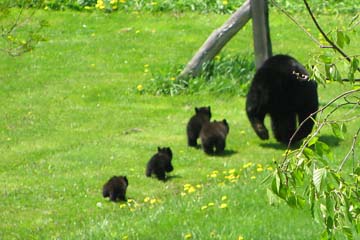| Home | About | Archives | RSS Feed |

Bruins' Beauty Sleep Ending
 Mass Wildlife says it's time to take down those bird feeders in Western Mass. With the snow melting and longer day length, bears will soon be leaving their winter dens and feeders should be removed by mid-March at the latest.
Mass Wildlife says it's time to take down those bird feeders in Western Mass. With the snow melting and longer day length, bears will soon be leaving their winter dens and feeders should be removed by mid-March at the latest.
"There is little in the way of natural foods and bears learn to seek out high-energy human foods such as bird seed," says Laura Hajduk, DFW Bear Project Leader. "This may lead to conflicts that pose hazards to both bears and people."
According to Mass Wildlife:
 Massachusetts is home to approximately 3,000 resident bears, with the majority living west of the Connecticut River. Although many bears keep to their dens during the winter, some can be sporadically active and can seek out human related food sources. If you notice bear activity in the area earlier than mid-March, be proactive and remove bird feeders and other potential food sources promptly. Massachusetts is home to approximately 3,000 resident bears, with the majority living west of the Connecticut River. Although many bears keep to their dens during the winter, some can be sporadically active and can seek out human related food sources. If you notice bear activity in the area earlier than mid-March, be proactive and remove bird feeders and other potential food sources promptly. Bears have excellent long-term memories and remember which foods are available at different seasons, as well as where these foods can be found. Even if a feeder is inaccessible to bears, they will be attracted by the scent of seed and suet. Once they learn the location of these foods, bears will return. Bears are typically shy and fearful of people, but deliberate feeding or indirect availability of human food, coupled with a lack of harassment can cause bears to become accustomed to people. If bears lose their fear of people and develop a taste for human foodstuffs, bears can become bolder and may cause damage that ultimately results in harm to people or to the demise of the animal.  |
Don't leave out trash or pet foods either and keep sheds and barns locked. During the summer, don't put meat or sweet items in the compost piles — bears can sniff them out.
Hajduk said taking these actions also reduces problems with other common wildlife species such as coyotes, raccoons, skunks, and foxes. More black bear information can be found at www.mass.gov/dfwele/dfw/wildlife/living/living_with_bears.htm.
| Tags: bears, birds |

